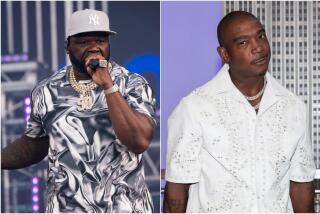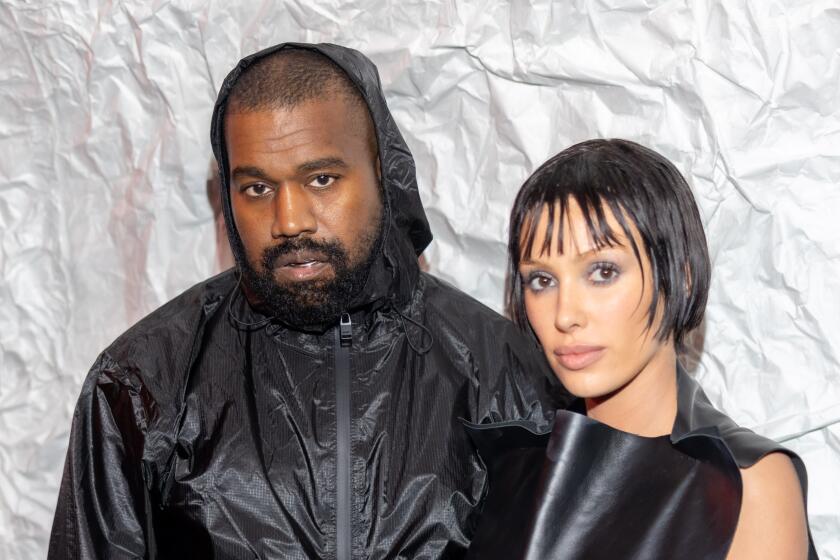Long Before Trial, Hints of a Destructive Obsession
I was there at the Pasadena Civic Auditorium in March 1983 when Michael Jackson first showed the world his moonwalk. It was electrifying.
He moved with such flair that the next morning I called one of his managers to make sure it wasn’t some kind of trick. A conveyer belt, perhaps, set into the stage?
The trick, of course, wasn’t in the dancing. It was in the man, a child star on the threshold of an amazing second act in which he moved from awkward adolescence into global superstardom.
That night, in the midst of legends like Marvin Gaye, Smokey Robinson and Diana Ross, on hand to tape a Motown Records anniversary salute, Jackson exuded such confidence that there seemed to be no limit to his talent and his imagination. I pinpoint it now as his unofficial coronation, at 24, as the King of Pop.
Within months, he changed the way people would hear and see pop music, unleashing an influence that rivaled that of Elvis Presley and the Beatles. He revolutionized pop music videos by infusing them with the ambition and craft of mini-films, and he made R & B so sensual and irresistible that, after its eventual partnering with hip-hop, it replaced rock as the dominant sound in American pop.
It’s easy to forget now, looking at the freakish spectacle that Jackson has become, that he once was the most commanding figure in all of pop music. Yet even at the height of his moonwalking triumph, there were hints of the destructive obsession that would end up derailing his career. He became more captivated by the pursuit of celebrity than artistic innovation.
A year after the Motown taping, I spent time with Jackson during his “Victory” tour, trying to organize a family photo book that he wanted to do for Doubleday, with Jacqueline Kennedy Onassis as the editor. As it turned out, my involvement with the book was short-lived, but the experience gave me a chance to observe one of pop’s most fascinating figures at unusually close range.
At the time, Jackson was still living at his parents’ home, behind a massive gate on a busy street just off of Ventura Boulevard in Encino. One day, he invited me over and led me to a cabinet in his upstairs room, which was filled with dolls and life-sized mannequins. It was his personal fairy-tale land. He pulled out a piece of paper on which he had written his 10 rules of stardom.
I don’t remember them all, but one was “never get married,” a vow he later broke, and another was “don’t give interviews.”
In talking about the list, Jackson went on and on about the importance of mystery and secrecy. Elvis didn’t do interviews, he said somberly one day. People were fascinated by Howard Hughes, he added, because Hughes also kept his life a secret.
A great irony of Jackson’s story is how this man who valued privacy above all -- and for whom controlling his image was an art form -- found himself in recent months at the center of the most privacy-invading spectacle imaginable, with law enforcement officials combing through his bedroom and witnesses offering graphic testimony.
When I was with him in the 1980s, I was struck by how much he seemed to be living out his own show-business fantasies, including that famous chase scene in the Beatles’ “A Hard Day’s Night.” We spent an hour one afternoon in a nearly deserted bookstore in Hollywood, going through the movie section. Jackson kept looking around to see if anyone was noticing him. When someone did look in his direction, he giggled with delight.
When we walked outside, he suddenly started running around the corner to the car. “They were going to come after us, I could tell,” he said. The two teenagers had vaguely looked in his direction and just continued on their way.
Another time, Jackson arranged for a library in Philadelphia to stay open late so he could go through its entertainment shelves. He called over people to see what he’d found -- a new book on Fred Astaire, a picture of James Brown or Katharine Hepburn.
He felt he was destined to stand alongside them. He studied their breakthroughs and their failures.
Who knows the real story behind the marriage to Lisa Marie Presley, but what better move for someone who wanted to be the most famous pop star of all time than to marry the daughter of the one singer who was more famous?
Similarly, what could cement Jackson’s fame-for-the-ages dreams more than being best friends with such stars for the ages as Elizabeth Taylor and Marlon Brando?
I’ve always suspected that Jackson encouraged many of the tales of his eccentricity -- stories such as the one about sleeping in an oxygen tank or wanting to buy the Elephant Man’s bones. He bought into the Howard Hughes mystique so heavily that he thought that the more eccentric he appeared, the greater the public fascination.
And it may have worked for a while, but it backfired when his music lost its appeal. He became so driven to outsell “Thriller” -- believed to be the biggest-selling album in the world, ever -- that he began to try to design the music to fit various demographics and various radio formats.
He increasingly equated greatness with sales, and in those moments you could begin to feel him losing his way as an artist.
When his follow-up album, “Bad,” didn’t come close to outselling “Thriller,” he seemed to grow more desperate. Instead of making great music, he tried to make commercial music and in the process became largely unlistenable.
As the music got worse, the eccentricities became more and more laughable. And Jackson went from figure of mystery to object of ridicule.
Through it all, there were the children. Their interaction, from what I saw, looked innocent but had poignant emotional overtones.
I’ll never forget a party he threw at a downtown hotel after his 1984 Dodger Stadium concert with his brothers. Brooke Shields, who had been, incredibly enough, linked to him as a romantic partner, showed up but had to cool her heels in the suite entryway for nearly an hour.
As Shields waited, I looked through the open door to his bedroom and saw Jackson on the bed having a pillow fight with youngsters. He looked like he was having the time of his life.
In what was surely a far greater turning point than the moonwalk debut 22 years ago, Jackson won his freedom Monday in a Santa Maria courtroom.
Others may speculate on what that means in terms of whether the public will continue to accept him as a performer. As a critic, I’m wondering whether the turmoil of recent months could jolt him into reconnecting with the part of him that was once more in love with the music than the celebrity.
Is it possible to ask for a third act?
That’s a verdict still to come.
*
Robert Hilburn is The Times’ pop music critic.
More to Read
The biggest entertainment stories
Get our big stories about Hollywood, film, television, music, arts, culture and more right in your inbox as soon as they publish.
You may occasionally receive promotional content from the Los Angeles Times.






